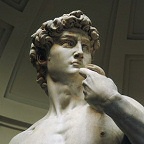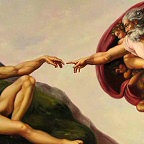(Third in a series comparing the social impact of theological differences between Christianity and Islam)
 In my last post, I compared Muslim and Christian beliefs about tawhid and trinity. I mentioned that tawhid had implications for the nature of man as well as the nature of god. Tahwid means not only that there is one God, but also that nothing in creation can be associated with god and that god cannot associate himself with anything in creation. It means that the incarnation of God in Jesus Christ is metaphysically impossible for the Muslim god. It also means that there can be no image of god in human beings.
In my last post, I compared Muslim and Christian beliefs about tawhid and trinity. I mentioned that tawhid had implications for the nature of man as well as the nature of god. Tahwid means not only that there is one God, but also that nothing in creation can be associated with god and that god cannot associate himself with anything in creation. It means that the incarnation of God in Jesus Christ is metaphysically impossible for the Muslim god. It also means that there can be no image of god in human beings.
Since the Christian God is a trinity with eternal relational moral attributes like integrity and love, when God bestows those attributes upon part of his creation, then that part of creation becomes “made in the image of God.” But the Muslim god, as a singularity without eternal relational attributes, cannot bestow moral attributes upon any creatures as any portion of his own nature.
 In Christian anthropology, the moral attributes of human beings participate in the infinite and eternal qualities of God. It makes all human life equally sacred and valuable. God is infinite, so likeness of God in mankind is also infinite. Compared to the infinity of God’s likeness in mankind, other differences between people (like gender, race, status, intelligence, disability, or religious affiliation) disappear into relative insignificance when compared to infinity. Compared to infinity, anything else that is not also infinite resolves to zero. Therefore, before God all people are not only equal, but are also infinitely significant because they participate in infinity. If human beings are “made in the image of God,” then laws against discrimination based on race, religion, disability, or gender, are rationally and objectively rooted in the eternal nature of God as opposed to arbitrarily rooted in how things were created.
In Christian anthropology, the moral attributes of human beings participate in the infinite and eternal qualities of God. It makes all human life equally sacred and valuable. God is infinite, so likeness of God in mankind is also infinite. Compared to the infinity of God’s likeness in mankind, other differences between people (like gender, race, status, intelligence, disability, or religious affiliation) disappear into relative insignificance when compared to infinity. Compared to infinity, anything else that is not also infinite resolves to zero. Therefore, before God all people are not only equal, but are also infinitely significant because they participate in infinity. If human beings are “made in the image of God,” then laws against discrimination based on race, religion, disability, or gender, are rationally and objectively rooted in the eternal nature of God as opposed to arbitrarily rooted in how things were created.
 But in Muslim theology of mankind, nothing in man can be anything like god. Therefore, the moral attributes of human beings cannot be anything like the attributes of god. Therefore mankind’s worth and moral attributes are arbitrarily part of creation and not intrinsically part of god and eternity. No part of human essence is either divinely sacred or joined to infinity in a way that by comparison eclipses physical and social differences. Islam does teach that God has created human beings with equal dignity that is higher than the rest of creation (Quran 17:70). However, differences in gender and religious affiliation are legally significant in Islam. A man’s testimony has more weight than a woman’s, and non-Muslims have different status than Muslims in Muslim law. Furthermore, only non-Muslims have freedom of religion under Muslim law. Non-Muslims are free to convert to any faith they choose, but Muslims are not free to leave Islam.
But in Muslim theology of mankind, nothing in man can be anything like god. Therefore, the moral attributes of human beings cannot be anything like the attributes of god. Therefore mankind’s worth and moral attributes are arbitrarily part of creation and not intrinsically part of god and eternity. No part of human essence is either divinely sacred or joined to infinity in a way that by comparison eclipses physical and social differences. Islam does teach that God has created human beings with equal dignity that is higher than the rest of creation (Quran 17:70). However, differences in gender and religious affiliation are legally significant in Islam. A man’s testimony has more weight than a woman’s, and non-Muslims have different status than Muslims in Muslim law. Furthermore, only non-Muslims have freedom of religion under Muslim law. Non-Muslims are free to convert to any faith they choose, but Muslims are not free to leave Islam.
Because of tahwid, in Islam, human dignity flows arbitrarily from the way that people are created rather than from the innate infinite likeness of God in mankind. As a practical result, human rights vary depending upon physical characteristics, behaviors, and social affiliations.
Because of the trinity, in Christianity, human dignity flows from an innate infinite likeness to God in each person rather than from arbitrarily created characteristics or chosen behaviors and affiliations. As a practical result, human rights are the same for all people whatever their differences or affiliations. Men, women, Muslims, Buddhists, and Christians are all the same before God and the law.
The image of God in man makes people different from everything else that God created, and it results in a divine expectation for people to be stewards of the rest of creation. I will address the implications on caring for creation in my next post.
People become like what they worship, and they relate to one another based upon the way that they relate to God. Gender, race, and interfaith relations are a challenge in all societies, but gender, race, and religious discrimination are bigger problems in Muslim majority societies than in Christian majority ones because of different beliefs about the image of God in man.
Link through the chart to other posts on the social impact of Muslim and Christian theology:








 Act Beyond
Act Beyond http://www.faithandwar.org
http://www.faithandwar.org Mark Durie's Blog
Mark Durie's Blog Military Missions Network
Military Missions Network The Christian Fighter Pilot
The Christian Fighter Pilot The Navy Christian
The Navy Christian
The doctrine of the image of God means that God can share his attributes and maintain his unity. This is a fundamentally different concept of God compared to Islam.
Many Reformed theologians distinguish between the communicable attributes (those that human beings can also have) and the incommunicable attributes (those that belong to God alone).